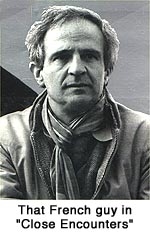Since this is a
film journal, I might as well toss in some remarks about films
and directors that have recently taken an influence on me.
I had heard about the French New Wave in film (circa 1960)
but hadn't seen any of these films. I knew that they were
very influential to many other directors, but since I never
went to film school and they never seem to be shown on HBO
or have them at Blockbuster Video, I've never had the chance
to see any of them. My girlfriend works at a library and she
has access to all sorts of obscure crap, so she was able to
find a VHS copy of "Breathless" by Jean-Luc Goddard and "The
400 Blows" by Francois Truffaut.
 So
here's how my (ignorant) mind works: Since these were French
films, I thought they'd all be about humping. (I saw "The
Last Tango In Paris", I liked it. French girls always wear
black, fishnets and berets, so they like to hump..right?)
:-P With
a name like "The 400 Blows" it figured it must've been an
early fetish video. I knew who Truffaut was, he was the French
guy in Steven Spielbergs "Close Encounters of the Third Kind."
I also knew he did those early fetish videos back in the 60's.
(or so I thought)
So
here's how my (ignorant) mind works: Since these were French
films, I thought they'd all be about humping. (I saw "The
Last Tango In Paris", I liked it. French girls always wear
black, fishnets and berets, so they like to hump..right?)
:-P With
a name like "The 400 Blows" it figured it must've been an
early fetish video. I knew who Truffaut was, he was the French
guy in Steven Spielbergs "Close Encounters of the Third Kind."
I also knew he did those early fetish videos back in the 60's.
(or so I thought)
It was amazing
how shitty "Breathless" sounded and looked. I guess this was
a real indie film of it's day, and it's kinda hard to see
what was so original about it with our modern day eyes. Jump
cuts galore, shakey camera, rambling dialogue about who slept
with whom. I guess you've got to imagine your seeing it in
1960 when it came out. 60's film critic: "Jesus..what moron
would use jump cuts, shakey grainy camerawork with weird dialog
that didn't advance the plot?" :-)
The 400 Blows is
about KIDS? Jeez! I was hopin' we would actually SEE the 400
blows to someones face, neck and head. (French boxing movie
of some sort?) Apparently each "blow" is a metaphor of lost
innocences to childhood. Anyhoo...the movie was good (for
something that came from 1959.) I can see why Spielberg was
so into Truffaut. Truffaut loved to make movies about kids.
(Not dopey, Hollywood type kiddies, but kids with real-life
attitudes.)
After watching
these two films, I would have to agree that these guys DID
do something that was advanced for it's time. (Like I said,
when you watch them now, it's hard to see what was so special,
EVERYONE does what they did first back then.) Therese
grabbed a book on Francois Truffaut called "Truffaut on Truffaut,"
it's created out of quotes said by him during his lifetime.
(He died in 1984.) Lemme toss off a few at you that I thought
were relevant to what I've learned during filming:
The young director
must not say to himself: "I'm going to try to get my foot
into this redoubtable industry by making a compromise between
what the producer wants and what I want, by pretending to
cook up for him the comedy or detective film he expects but
sticking to my own little ideas." etc., because with that
reasoning you're lost in advance. You need to say to yourself:
"I'm going to knock off for them something so sincere that
it will be howling with truth and of a formidable force; I'm
going to prove to them that truth pays off in hard
cash and that my truth is the only truth." I mean, the young
director must be convinced that he should not work against
the producers nor against the public but that he has to convince
them, bowl them over, seduce them, put them in his pocket.
You have to be desperately ambitious and desperately sincere,
if the enthusiasm you felt while shooting is to communicate
itself in the showing and win over the public. The starting
point must be the principle that any constraint you accept
gets you only aridity and insipidity , whereas if you love
what you film, the public too will probably love it. But isn't
all that obvious?
Francois Truffaut, Arts, 1958
I believe that
an idea that pleases an artist will by definition displease
the public. Why? Because the artist is someone OUTSIDE society
and addresses himself TO society. So what it amounts to is
imposing your own originality on people and not falling in
with their banality. Yes, you really have to say things as
they are. It's a work on conviction, and the whole undertaking
becomes a match with people.
Francois Truffaut, Tele-Cinema, no 341, October
1966
He [Jean-Loc
Godard] has killed off, all by himself, the two or three worst
things I know about the public: polite indifference, vague
interest, amused condescension.
Francois Truffaut, L'Avant-Scene Cinema, no
70, May 1967
But I am sure
we have all ended up adopting Andre Bazin's mayonnaise theory
(films that "take" or don't take) because the practice of
cinema has taught us a certain number of things:







